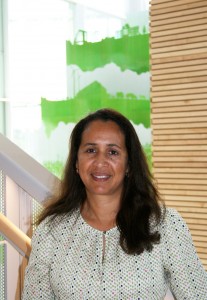Ph.D. student returns to Brazil
“When I started looking for universities to get my degree, I was looking for the best ones – the top five universities – and ISU was very well ranked,” explained Laurimar Goncalves Vendrusculo about her choice to attend Iowa State’s agricultural engineering Ph.D. program. Although she recently completed the program and will be returning to Brazil, she knows attending Iowa State was the right choice, “Here, you have a big opportunity to improve your network.”

Vendrusculo was also impressed by her advisor’s prompt email response and willingness to work with her research interests, which centered on soil erosion in classic gullies.
A gully, or steep drainage way that comes from a quarry in the landscape, produces disproportionally sized sediments. Knowing the location of a gully is important because soil control structures can be designed and placed at specific points in the landscape to trap sediments. Vendrusculo has been tracking this information through technology, like data mining for big data and LiDAR (Light Detection and Ranging), which is a remote sensing technology that uses lasers to measure distance.
Vendrusculo is also interested in learning how gullies grow over time. To study this, she has compared two gullies over a 15-year period and developed a new preservation technique design based on slope stability. The approach will be useful for stakeholders and farmers using precise agricultural application techniques, as Vendrusculo’s design recommends using buffers and vegetation where it is needed to prevent gullies from forming and minimize actual classic erosional effects.
Despite her success with her research projects, Vendrusculo thought she might not be able to accomplish her research goals after her computer crashed few months before her final dissertation defense. Doubling her efforts to keep on schedule, even doing fieldwork, she produced positive results. This unforeseen challenge made Vendrusculo realize why she loved being an engineer.
She admitted, “I think I am the type of person who gets bored if I do the same thing every day. I like the challenge.” Even the core of her project, selecting and testing terrain and water quality variables that capture gully form, creates a lot of variety to consider. She also enjoys working in different subject areas and on research questions while using problem-solving skills, physics and biology principles.
After returning to Brazil, Vendrusculo will continue a career as a scientist with her former employer Embrapa Informatica Agropecuaria. One of her main goals is to start data collection similar to LiDAR on a broader scale. She explained that in the United States, there is huge amount of historic spatial data, including image satellites and aerial imagery, but Brazil only has a few initiatives. Vendrusculo adds that starting a detailed data collection service would help researchers and students with their own projects to improve water and soil quality in the country.
Vendrusculo’s future work includes participating in efforts to create sustainable agricultural processes dealing with climate change in Brazil, as well as tracking environmental licensing in the North Region of Brazil including the Amazon Forest. She says this type of information can be used to explain to people when and why they need to take care of the environment.
